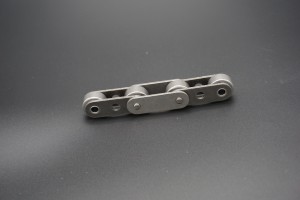The strength of a roller chain is determined by several key factors, including the materials used in its construction, the design of the chain, and the quality of its manufacturing. Roller chains are typically made from high-strength steel, known for its excellent tensile strength as well as wear and fatigue resistance. This allows the roller chain to withstand high loads and operate under harsh conditions.
The design of a roller chain also plays a vital role in its strength. The pitch, or distance between adjacent pin centers, and the diameter of the rollers are important factors in determining a chain’s load-bearing capacity. Additionally, the number of strands in the chain and the type of attachments used can also affect its strength. Chains with larger pitches and thicker rollers are generally able to handle higher loads, while multi-strand chains offer greater strength and reliability.
Manufacturing quality is another key factor in determining the strength of a roller chain. Chains that are precision engineered and manufactured to tight tolerances are more likely to exhibit superior strength and durability. High-quality manufacturing processes such as precision machining and heat treatment enhance the mechanical properties of the steel, making the chain stronger and more reliable.
In addition to the inherent strength of a roller chain, its ability to withstand dynamic and impact loads is an important consideration. Roller chains are designed to accommodate the pulsating forces and vibrations that occur during operation, making them ideal for applications with unstable loads. This dynamic load capacity demonstrates the strength and resilience of roller chains, allowing them to operate reliably under a wide range of operating conditions.
When assessing the strength of a roller chain, environmental factors that affect its performance must be considered. Over time, exposure to corrosive chemicals, extreme temperatures, or abrasive contaminants can reduce the strength and integrity of the chain. Therefore, selecting a roller chain with appropriate corrosion resistance and environmental protection is crucial to ensure its long-term strength and reliability.
Proper maintenance and lubrication also play a vital role in maintaining the strength of roller chains. Regularly checking, cleaning and lubricating your chain and sprockets will help prevent wear and stretch, maintain the strength of your chain and extend its life. Additionally, proper chain tensioning is critical to preventing excessive stress and premature failure.
In industrial applications, where the strength and reliability of roller chains are critical, specialized chains specifically designed to handle high loads and harsh operating conditions are often used. These heavy-duty chains are engineered with enhanced strength and durability such as thicker plates, hardened pins and special coatings to ensure optimal performance in demanding environments.
In summary, the strength of a roller chain is the result of a combination of high-quality materials, precision design and superior manufacturing processes. Roller chains are able to withstand high loads, dynamic forces and challenging operating conditions, making them a reliable and efficient power transmission solution for a variety of applications. By understanding the factors that affect roller chain strength and implementing proper maintenance practices, users can ensure the longevity and performance of their chains in a variety of industrial and mechanical systems.
Post time: May-20-2024

